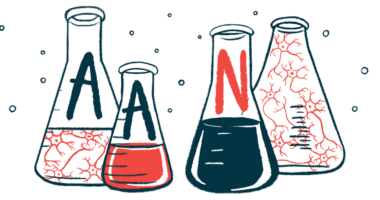PrimeC Therapy Added to Standard Care Gets ALS Biomarkers Down

NeuroSense Therapeutics’ combination therapy PrimeC led to a significant decline in certain biomarkers of amyotrophic lateral sclerosis (ALS) when used as an add-on to standard of care treatment, a study found.
Standard treatment alone, meanwhile, appeared to have no impact on these disease-related biomarkers.
The preliminary results come from the third stage of a biomarker study that the company is conducting in collaboration with Massachusetts General Hospital (MGH), in Boston.
“These results are very encouraging, especially in that they validate NeuroSense’s clinical strategy,” Alon Ben-Noon, CEO of NeuroSense, said in a company press release. “NeuroSense is honored to collaborate with the world-class MGH team on this critical study.”
More details will be shared at the upcoming World Orphan Drug Congress, to be held July 11–13, in Boston.
PrimeC is a fixed-dose combination of ciprofloxacin and celecoxib. The two medications are approved for indications other than ALS, but together they are expected to help slow ALS progression by targeting mechanisms that contribute to nerve cell death.
The combination therapy was first evaluated in a Phase 2a trial (NCT04165850), in which it effectively slowed disease progression when taken as an oral capsule three times daily for a year.
But the company recently launched a Phase 2 trial called PARADIGM (NCT05357950) to investigate an extended-release formulation of PrimeC. With this formulation, the medications are released in a controlled manner over a longer period of time.
PARADIGM is now recruiting adults, ages 18–75, at a single site in Israel, with additional locations in the U.S. and Italy expected to open in the future. In all, the trial expects to involve about 69 patients. The first participant was enrolled earlier this month.
Participants will be randomly assigned to take twice-daily PrimeC (four tablets in total each day) or a placebo, for six months. The trial is double-blinded, meaning that neither patients nor researchers will know who is receiving the medication and who gets the placebo.
The biomarker study evaluating PrimeC as a treatment for ALS was done in three stages. In the first stage, NeuroSense set out to identify biomarkers that could determine how PrimeC works in the body — its mechanism of action.
In the second stage, the company examined how these blood biomarkers changed in patients who received PrimeC in the Phase 2a clinical trial. The findings showed that biomarkers such as TDP-43 protein clumps, inflammation of the nervous system, and iron accumulation all were reduced after PrimeC treatment.
The last stage was designed to assess changes in the blood biomarkers of patients who were receiving standard care alone or in combination with PrimeC. In patients on standard care alone, the levels of these biomarkers remained steady and unchanged. But significant reductions were seen among participants who also received treatment with PrimeC.
The PARADIGM trial will also confirm these findings by looking at changes in a number of ALS-related biomarkers, including markers of iron metabolism. These include serum ferritin, transferrin, and iron.
“NeuroSense remains at the forefront of biomarker research with the inclusion of a comprehensive portfolio of biomarkers in our Phase IIb study. This is essential in exploring mechanistic associations in ALS,” said Shiran Zimri, PhD, who heads the scientific programs at NeuroSense.
Zimpri said the company is using “cutting-edge technology [that] allows one to observe key alterations in biomarkers found in the central nervous system.”
“The biomarker study, along with the data we collect from our Phase IIb study, will inform the optimization of a pivotal Phase III study of PrimeC in ALS,” concluded Ben-Noon.







